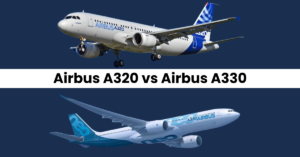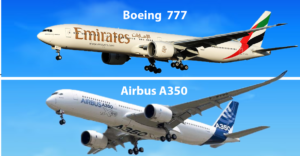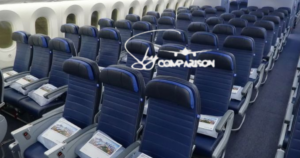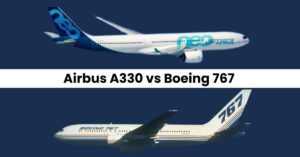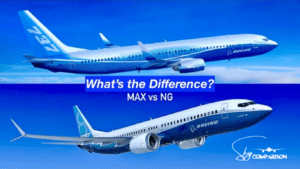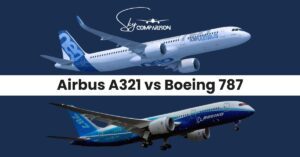Airbus vs Boeing Which is Better | Planes | Crashes | Safety
The aviation industry has long been dominated by two giants: Airbus vs Boeing. These companies have been at the forefront of innovation and competition, pushing the boundaries of what is possible in commercial aviation. In this article, we’ll delve into their histories, compare their aircraft, market share, safety records, comfort levels, plane prices, and stock performance.
Airbus vs Boeing
When it comes to the world of aviation, Airbus and Boeing stand out as the heavyweight contenders. Airbus, hailing from Europe, and Boeing, rooted in America, are titans in crafting various aircraft, ranging from compact models ideal for short hops to colossal jets built for intercontinental journeys. While Airbus often secures more sales in regions like Europe and Asia, Boeing boasts a strong presence in its home turf of North America. Both companies continuously strive to innovate, enhancing their aircraft for improved safety, efficiency, and passenger comfort. Despite encountering challenges along the way, such as Boeing’s recent troubles with one of its planes and Airbus facing its own setbacks, they remain committed to advancing air travel worldwide. Whether it’s by pioneering new technologies or addressing customer needs, Airbus and Boeing play pivotal roles in shaping the future of aviation.
Airbus

Airbus is a major aerospace company known for designing, manufacturing, and selling commercial aircraft, helicopters, satellites, and defense systems. It’s one of the world’s leading aircraft manufacturers, competing closely with Boeing. Airbus produces a wide range of aircraft, from single-aisle planes like the A320 family to wide-body jets like the A350 and the double-decked A380, capable of carrying hundreds of passengers over long distances. The company is known for its innovative approach to aircraft design and its focus on efficiency, safety, and environmental sustainability. With a global presence and a strong reputation for quality and reliability, Airbus plays a significant role in shaping the future of air travel.
Boeing

Boeing is a major player in the aerospace industry, specializing in the design, manufacture, and sale of airplanes, rotorcraft, rockets, satellites, and telecommunications equipment. It’s one of the largest aerospace companies in the world, known for its iconic commercial aircraft such as the 737, 747, 777, and 787 Dreamliner series. Boeing also produces military aircraft, including fighter jets and transport aircraft, as well as spacecraft and satellites for various purposes. The company has a long history of innovation and technological advancement, with a focus on safety, reliability, and efficiency in its products. With a global presence and a diverse portfolio of products and services, Boeing continues to be a leader in the aerospace industry, shaping the future of air and space travel.
Airbus vs Boeing Differences
Airbus and Boeing are two major players in the aviation industry, each with its own distinctive characteristics. One key difference lies in their design philosophies: Airbus tends to favor fly-by-wire technology, where computer systems assist pilots in controlling the aircraft, while Boeing often emphasizes manual control, giving pilots more direct input. Another notable contrast is in their approach to aircraft size and range. Airbus tends to focus on larger aircraft suited for long-haul flights, such as the A380 and A350, while Boeing offers a wider range of sizes, including smaller models like the 737 and larger ones like the 777 and 787. Additionally, the companies have different manufacturing processes and supply chains, leading to variations in assembly techniques and component suppliers. Despite these differences, both Airbus and Boeing strive to deliver safe, efficient, and reliable aircraft to meet the diverse needs of the global aviation market.
Airbus vs Boeing Planes
Creating a comprehensive table that covers all models from Airbus and Boeing, including their capacity and range, provides a broad overview of the offerings from these aviation giants. This table simplifies the comparison, focusing on the key specifications that differentiate each model, catering to various airline needs from short regional hops to long intercontinental journeys.
| Manufacturer | Aircraft Model | Typical Capacity | Range (Nautical Miles) | Category |
|---|---|---|---|---|
| Airbus | A318 | 132 passengers | 3,100 | Narrow-Body |
| Airbus | A319 | 156 passengers | 3,700 | Narrow-Body |
| Airbus | A320 | 180 passengers | 3,400 | Narrow-Body |
| Airbus | A321 | 244 passengers | 4,000 | Narrow-Body |
| Airbus | A330-200 | 246 passengers | 7,250 | Wide-Body |
| Airbus | A330-300 | 300 passengers | 6,350 | Wide-Body |
| Airbus | A330-800neo | 406 passengers | 8,150 | Wide-Body |
| Airbus | A330-900neo | 287 passengers | 7,200 | Wide-Body |
| Airbus | A350-900 | 300-350 passengers | 8,100 | Wide-Body |
| Airbus | A350-1000 | 350-410 passengers | 8,700 | Wide-Body |
| Airbus | A380-800 | 555 passengers | 8,000 | Jumbo Jet |
| Boeing | 737 MAX 7 | 172 passengers | 3,850 | Narrow-Body |
| Boeing | 737 MAX 8 | 210 passengers | 3,550 | Narrow-Body |
| Boeing | 737 MAX 9 | 220 passengers | 3,550 | Narrow-Body |
| Boeing | 737 MAX 10 | 230 passengers | 3,300 | Narrow-Body |
| Boeing | 747-8 | 410 passengers | 7,730 | Jumbo Jet |
| Boeing | 767-300ER | 218 passengers | 5,980 | Wide-Body |
| Boeing | 777-200LR | 317 passengers | 8,555 | Wide-Body |
| Boeing | 777-300ER | 396 passengers | 7,370 | Wide-Body |
| Boeing | 777X-8 | 384 passengers | 8,730 | Wide-Body |
| Boeing | 777X-9 | 426 passengers | 7,285 | Wide-Body |
| Boeing | 787-8 Dreamliner | 242 passengers | 7,305 | Wide-Body |
| Boeing | 787-9 Dreamliner | 290 passengers | 7,530 | Wide-Body |
| Boeing | 787-10 Dreamliner | 330 passengers | 6,430 | Wide-Body |
Airbus vs Boeing Cockpits
When comparing Airbus vs Boeing cockpits, it’s like stepping into two different worlds of flying. Airbus cockpits typically feature a side-stick control for the pilot, while Boeing aircraft usually have a yoke or control column. This distinction in control mechanisms can impact the feel and handling of the aircraft for pilots. Additionally, Airbus cockpits often incorporate more digital displays and fly-by-wire technology, providing pilots with advanced automation and information systems.
On the other hand, Boeing cockpits may have a mix of analog and digital instruments, offering a more traditional flying experience for some pilots. Ultimately, both Airbus and Boeing prioritize safety, functionality, and ergonomics in their cockpit designs, ensuring pilots have the tools they need to operate their aircraft efficiently and safely.
Airbus vs Boeing Safety
When it comes to safety, both Airbus and Boeing take it seriously. They’ve got strict rules and regulations to make sure their planes are as safe as can be. Airbus boasts about its cutting-edge technology and advanced safety features, like computer systems that help pilots fly smoothly. On the other hand, Boeing has a long history in aviation and emphasizes rigorous testing to ensure their planes meet top safety standards. While both companies have had their share of challenges, like Boeing’s issues with the 737 MAX, they’re always working to improve. Ultimately, it’s hard to say which company is better in safety because they both prioritize it so much. It often comes down to individual incidents and how the companies respond to them. So, whether you’re flying on an Airbus or Boeing plane, rest assured that safety is their number one priority.
Airbus vs Boeing Crashes
When it comes to comparing crashes, the numbers tell a story. Airbus has had 35 crashes out of 28.3 million flights, meaning there’s about 0.81 million flights for every crash. On the other hand, Boeing has seen 251 crashes out of 461 million flights, giving it roughly 1.84 million flights per crash. Looking at the numbers, it seems like Boeing has had more crashes overall. However, when you consider the number of flights per crash, Airbus comes out with a slightly better ratio. But it’s important to remember that each crash is a tragedy, and both Airbus and Boeing are continuously working to make flying safer for everyone.
Airbus vs Boeing Comfort
When it comes to comfort in the skies, Airbus and Boeing have their own styles. Airbus planes often have wider seats and more spacious cabins, making them feel roomier for passengers. They also tend to prioritize features like larger windows and quieter cabins, providing a more relaxing environment during flights. On the other hand, Boeing aircraft are known for their classic design and familiar layout. While they may not have as much roominess as Airbus planes, Boeing jets offer a cozy and familiar atmosphere that many passengers appreciate. Ultimately, whether you’re flying on an Airbus or Boeing aircraft, both manufacturers aim to make your journey as comfortable as possible, ensuring a pleasant experience for travelers around the world.
Airbus vs Boeing Market Share
When it comes to market share, Airbus and Boeing are like heavyweight contenders in the aviation industry. Airbus tends to have a strong foothold in Europe and parts of Asia, while Boeing dominates in North America. Both companies compete fiercely for orders from airlines and leasing companies worldwide, constantly striving to outdo each other. While specific market share percentages can vary over time, depending on factors like new aircraft launches and economic conditions, both Airbus and Boeing remain key players in the global aerospace market. Whether it’s the iconic Airbus A320 or the classic Boeing 737, these manufacturers continue to shape the future of air travel with their innovative aircraft designs.
Airbus vs Boeing Stock

When it comes to comparing Boeing and Airbus stocks, investors often weigh various factors to make informed decisions. Boeing, as a U.S.-based company, has historically been a heavyweight in the stock market, with its shares being closely watched by investors worldwide. Airbus, on the other hand, being a European multinational, also commands attention in the stock market, particularly among European investors. Both companies’ stocks can be influenced by factors such as global economic conditions, geopolitical events, and company performance. While Boeing may have a larger market capitalization due to its long history and broader portfolio including defense contracts, Airbus often boasts a strong presence in the commercial aircraft market. Ultimately, investors assess the financial health, growth prospects, and market dynamics of both Boeing and Airbus when considering their stock investments, aiming to secure returns in an ever-evolving aerospace industry.
Airbus vs Boeing Revenue

When comparing the financial performance of aviation titans Airbus and Boeing, we witness two formidable players operating at the zenith of their industry. Airbus, reporting a net profit of €3.789 billion and revenue of €65.4 billion, demonstrates its robust position in the market. Conversely, Boeing, while facing a net loss of USD 2.2 billion, boasted a revenue of USD 77.794 billion. Notably, despite the loss, Boeing’s financial performance showcased improvement compared to the previous year, a testament to its ongoing recovery efforts.
Boeing’s revenue remains substantially higher than Airbus, reflecting its dominant position in the aerospace sector. A significant portion of Boeing’s revenue comes from its commercial airplane segment, showcasing its strength in aircraft production and related services. Airbus, on the other hand, relies on a more diversified revenue structure, drawing sales primarily from Europe, followed by the Asia-Pacific and North America regions. This diversity potentially provides Airbus with a buffer against economic uncertainties and market fluctuations.
In summary, while Boeing’s revenue outstrips that of Airbus, the latter demonstrates a more diversified revenue stream, indicative of its global reach and customer base. Boeing’s ongoing recovery efforts, despite reporting a net loss, underscore its resilience and determination to bounce back from challenges. Both companies showcase their strengths in distinct ways, reaffirming their status as leaders in the competitive aviation landscape.
Airbus vs Boeing Orders
In the dynamic world of aviation, Airbus and Boeing constantly vie for orders from airlines and other customers worldwide. These orders serve as a barometer of industry trends and the competitive landscape. Airbus and Boeing engage in fierce competition, each striving to secure more orders than the other. Airlines consider various factors when choosing between Airbus and Boeing aircraft, including performance, fuel efficiency, passenger comfort, and overall cost. The battle for orders often intensifies during major airshows and industry events, where both companies showcase their latest innovations and aircraft models. Ultimately, the number of orders each company receives reflects its ability to meet the evolving needs of the aviation market and maintain its position as a leading aircraft manufacturer.
Comparison and Context
- Market Recovery: Both Airbus and Boeing’s revenues reflect the aviation industry’s ongoing recovery from the COVID-19 pandemic’s impact. While Airbus has seen a more consistent recovery in its commercial aircraft segment, Boeing has faced additional challenges but is showing signs of stabilization and growth.
- Diversification: Boeing’s broader diversification across defense and services may offer it some cushion against fluctuations in commercial aircraft demand. In contrast, Airbus, while also involved in defense and space, has a significant portion of its revenue tied to its commercial aircraft.
- Future Outlook: The future revenue for both companies will heavily depend on the global economic climate, air travel recovery, and their ability to address production challenges and deliver new orders efficiently.
It’s important to note that these figures are subject to change as both companies release new financial reports and as the industry continues to evolve. Investors and analysts closely watch both Airbus and Boeing for signs of growth, recovery, and strategic adjustments to their operations and product offerings.
Analysis
The statistics indicate that Boeing aircraft have a lower frequency of crashes per million flights compared to Airbus. Specifically, Boeing’s rate of one crash per 1.84 million flights demonstrates a higher level of operational safety in this metric than Airbus’s rate of one crash per 0.81 million flights. This comparison, however, is nuanced and should be considered in the context of several important factors:
- Fleet Age and Usage: Boeing has a longer history and a larger cumulative number of flights, which could influence the crash rate. Older models with extensive service records might impact overall statistics.
- Model Diversity and Volume: Both manufacturers have a range of models with varying safety records. High-volume, older models like Boeing’s 737 Classic series and Airbus’s A320 family have different operational histories and improvements over time.
- Technological Advances and Learning Curve: Both Airbus and Boeing have continuously incorporated technological advancements and safety improvements into their aircraft designs. Incidents and accidents have led to industry-wide learning and enhancements in aviation safety protocols.
- Global Operations and Environmental Factors: The operational environment, including regional airline practices, maintenance standards, and flight conditions, also significantly affects safety records. Some crashes may be more attributable to these factors than to aircraft design or manufacturer faults.
Conclusion
In conclusion, the rivalry between Airbus and Boeing is not just a competition between two aerospace giants; it’s a reflection of the dynamic and ever-evolving aviation industry. Throughout this comparison, we’ve seen how both companies showcase their strengths and face their own set of challenges. Boeing’s long-standing presence and diverse portfolio have cemented its position as a heavyweight in the market, while Airbus’s innovative designs and global reach have solidified its place as a formidable competitor. Whether it’s in terms of aircraft design, market share, financial stability, or stock performance, both Airbus and Boeing continue to push the boundaries of innovation and shape the future of aviation. As they navigate through turbulent times and soar to new heights, one thing remains clear: the rivalry between Airbus and Boeing will continue to drive progress and innovation in the aerospace industry for years to come.
FaQs
What are the main differences between Airbus and Boeing aircraft?
While both Airbus and Boeing produce similar types of aircraft, such as narrow-body and wide-body jets, there are notable differences in their design philosophies and technological approaches. Airbus tends to favor fly-by-wire technology and centralized cockpit layouts, while Boeing often emphasizes traditional controls and distributed cockpit designs.
Which company has a larger market share?
Boeing has historically held a larger market share than Airbus, particularly in the United States. However, Airbus has been steadily increasing its market share over the years, especially in regions like Europe and Asia.
Are Airbus and Boeing publicly traded companies?
Yes, both Airbus and Boeing are publicly traded companies. Their stocks are listed on major stock exchanges, and investors can buy and sell shares in these companies.
How do Airbus and Boeing compare in terms of safety?
Airbus and Boeing both prioritize safety in their aircraft designs and manufacturing processes. Both companies adhere to strict safety standards set by aviation regulatory authorities worldwide. However, safety records can vary depending on factors such as the specific models of aircraft and individual incidents.
Which company is more financially stable, Airbus or Boeing?
Assessing the financial stability of Airbus and Boeing involves analyzing various factors such as revenue, profitability, asset base, liquidity, and operational efficiency. Both companies have their strengths and weaknesses in these areas, and their financial stability can fluctuate over time due to factors like market conditions and industry dynamics.
What are some of the notable aircraft models produced by Airbus and Boeing?
Airbus’s popular aircraft models include the A320, A330, A350, and A380, while Boeing’s notable models include the 737, 747, 777, and 787 Dreamliner. Each company offers a range of aircraft tailored to different market segments and customer preferences.
How does the rivalry between Airbus and Boeing impact the aviation industry?
The competition between Airbus and Boeing drives innovation, drives down costs, and offers customers a wider range of options when it comes to commercial aircraft. This rivalry ultimately benefits consumers by spurring technological advancements and improving the overall quality and safety of air travel.

